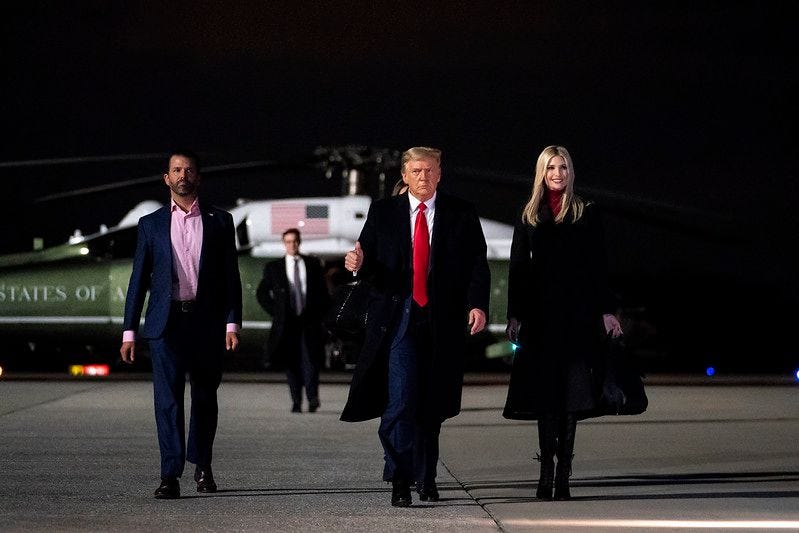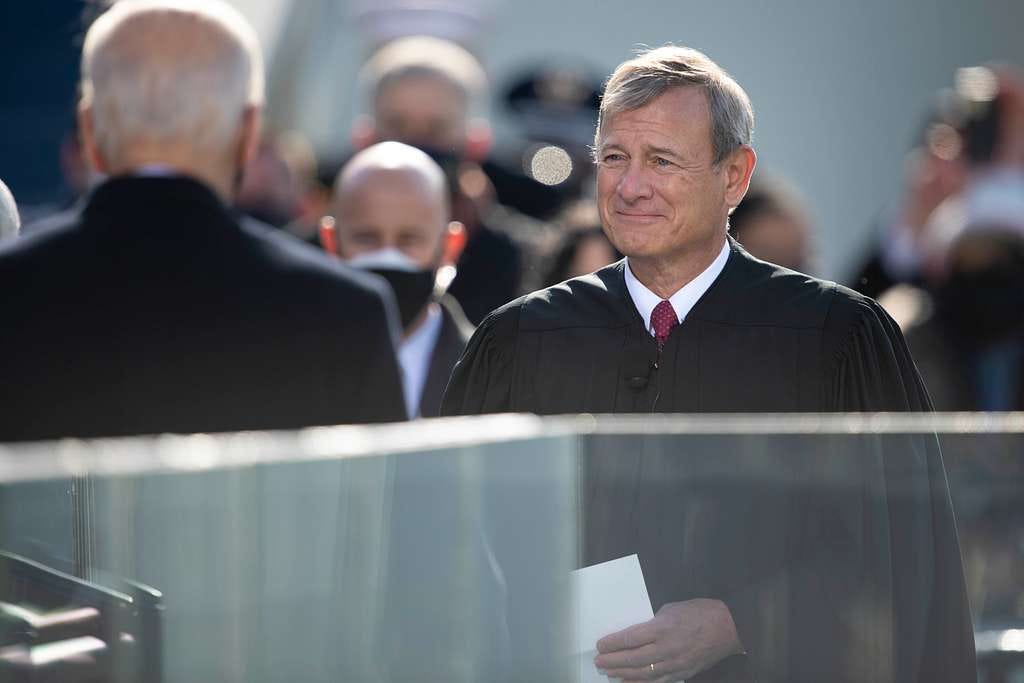Trump indicted — again
Everything you need to know about the first federal charges against a former U.S. president.
Good morning! It’s Friday, June 9, 2023. The 2024 elections are 515 days away.
There’s some big news to cover today. In today’s newsletter, I have everything you need to know about the Trump indictment: the charges, the backstory, the responses, and more.
A quick housekeeping note: There will be no newsletters on Monday or Tuesday next week — but I’ll be back on Wednesday, just in time to report on a certain high-profile arraignment.
If you appreciated my political coverage this week, including my piece on why long-shot candidates run for president, it’s always appreciated in turn if you contribute to support my work. You can donate here on a one-time or recurring basis. Now, to the news...
In historic first, Trump indicted for mishandling classified documents
Former President Donald Trump has been indicted by a federal grand jury for keeping classified documents at his Florida resort after leaving the White House.
According to ABC News, the indictment — which has yet to be unsealed — includes at least seven felony charges: willful retention of national defense information, conspiracy to obstruct justice, withholding a document or record, corruptly concealing a document or record, concealing a document in a federal investigation, scheme to conceal, and false statements and representations.
Together, the charges combine for a maximum penalty of 100 years in prison. The willful retention charge stems from the Espionage Act, one of the most sensitive statues in American law. Per The Messenger, at least one other person is expected to be indicted by Special Counsel Jack Smith alongside Trump as well.
Trump is set to surrender to authorities next week; he will be arraigned at the federal courthouse in Miami on Tuesday at 3 p.m. Eastern Time. Smith took something of a risk in prosecuting the case in Florida, and not Washington: although the move prevents Trump from contesting the venue of the charges, it could mean the jury will be more favorable to the ex-president.
The case is reportedly being overseen, at least initially, to U.S. District Judge Aileen Cannon, who Trump appointed in 2019 and who controversially sided with him during an earlier dispute stemming from the classified documents investigation.
The indictment marks an extraordinary political and legal development. Trump is the first sitting or former president to face federal charges; currently engaged in an active campaign to win back the White House, he is the first major presidential candidate to be indicted as well.
Trump, who was impeached twice during his presidency, was previously indicted at the state level for falsifying business records in New York; he also faces a criminal investigation in Georgia and an additional Justice Department investigation, both for his efforts to overturn the 2020 election.
After years of investigations, it is ironic that mishandling classified material should lead to the first federal charges against him. In 2016, Trump’s shocking elevation to the presidency was partly due to his attacks against his opponent, Hillary Clinton, for her handling of classified information. “Lock her up!” his supporters frequently chanted at campaign rallies.
Federal law requires presidents to hand over custody of all government documents to the National Archives upon leaving office. In May 2021, the Archives wrote Trump’s representatives, identifying several major documents that had not been transferred, including the former president’s letters with North Korean dictators Kim Jong Un.
After months of negotiations, in January 2022, Archives officials retrieved 15 boxes of documents from Trump’s Mar-a-Lago estate, sparking a Justice Department investigation. 184 of the documents contained classified markings.
In May 2022, the DOJ issued a subpoena for all classified documents in his possession. An additional 38 documents were returned at that time. Although Trump’s lawyer signed a letter certifying that the ex-president had turned over all materials requested in the subpoena, prosecutors remained suspicious, leading to an FBI search of Mar-a-Lago in August of that year.
During the search, which Trump decried as an abuse of power, agents found more than 11,000 government documents, including 103 that were classified. In total, according to prosecutors, Trump was found in 2022 to have more than 13,000 government documents in his possession, 325 of which were classified.
At times, Trump has admitted to keeping the documents, falsely stating in a CNN town hall last month that he had “every right” to take the classified material from the White House. He has also said he had the authority to declassify the documents just “by thinking about it.” In fact, there is a standard declassification process presidents are supposed to follow; there is no evidence that Trump did so while he was in office. (In any event, Trump was not allowed to keep any government documents after his tenure, classified or not.)
This morning, CNN reported on a taped conversation in 2021 in which Trump acknowledged that he had retained “secret” military information he did not declassify. “As president, I could have declassified, but now I can’t,” Trump reportedly said during the conversation.
The indictment threatens to upend the 2024 presidential race, in which Trump is the leading Republican candidate. In a post on Truth Social, his fledgling social media site, Trump alleged that the indictment amounted to “election interference” by the “totally corrupt” Biden administration. “I AM AN INNOCENT MAN,” he added.
Like after the FBI search and the New York indictment, Trump also called on other Republican officials to defend him; many, including his presidential rivals, complied. “Today is indeed a dark day for the United States of America,” House Speaker Kevin McCarthy (R-CA) wrote on Twitter, calling it “unconscionable for a president to indict the leading candidate opposing him.”
Gov. Ron DeSantis (R-FL), Trump’s main rival for the Republican nomination, suggested in a tweet that the indictment was evidence of “the weaponization of federal law enforcement.” Sen. Tim Scott (R-SC) and entrepreneur Vivek Ramaswamy also defended Trump, while former Govs. Asa Hutchinson (R-AR) and Chris Christie (R-NJ) — two additional contenders — issued less sympathetic messages.
Former UN ambassador Nikki Haley and former vice president Mike Pence, who excoriated Trump as he launched his campaign this week, have yet to comment. Senate Minority Leader Mitch McConnell (R-KY) has also not weighed in.
In responding to the indictment, Trump is returning to a well-worn playbook: lambasting the prosecutor, turning the charges back on his opponent, throwing anything at the wall to delegitimize the accusations against him.
Trump’s campaign has begun to circulate its lines of attack against Smith, the special counsel, including his previous prosecution of a top Republican (former Virginia Gov. Bob McDonnell, whose conviction was overturned) and his wife’s donations to Biden. Smith has served as a prosecutor for most of the last two decades, including as a war crimes investigator at the International Criminal Court, acting U.S. attorney in Tennessee, and head of the Justice Department’s Public Integrity Section.
Trump has also frequently pointed to Biden’s own mishandling of classified documents. Between November 2022 and January 2023, several Obama-era government documents — some of them classified — were found at two of Biden’s homes in Delaware and his private office in Washington, D.C.
Unlike Trump, Biden is not known to have flouted a subpoena to turn over any documents; he consented to an FBI search of his properties and, as far as is known, turned over all documents that were found in his possession. Another special counsel, Robert Hur, is investigating Biden for his actions.
More news you should know
The Supreme Court ruled Thursday that a Republican-drawn congressional map in Alabama illegally diluted the power of Black voters. The decision was 5-4, with Chief Justice John Roberts and Justice Brett Kavanaugh joining the court’s three liberals in the majority. Roberts surprised observers with his vote: previous decisions of his have gutted other part of the Voting Rights Act, but this opinion — which he authored — upheld a key section of the landmark 1965 law.
The Alabama map will now be redrawn, likely with a second majority-Black congressional district; the decision could mean other Southern congressional maps, including in Louisiana and Georgia, will need to be altered to reverse potential racial gerrymanders. According to the Cook Political Report, as many as four Republican-held House seats could flip to Democratic hands as a result of the decision. Read the opinion here
More key headlines:
“Cuba to Host Secret Chinese Spy Base Focusing on U.S.” WSJ
“Biden vetoes bill blocking student loan forgiveness program” CNN
“Biden administration to appoint anti-book ban coordinator as part of new LGBTQ protections” CBS
Today’s political planner
President Biden will travel to North Carolina, where he will tour Nash Community College (to promote workforce training programs) and visit Fort Liberty (to announce new executive actions to aid military families).
Fort Liberty’s name was changed from Fort Bragg last week; it is the most prominent instance of the Defense Department renaming a military base that previously been named for a Confederate soldier.
Vice President Harris has nothing on her public schedule.
The House and Senate are off until Monday.
The Supreme Court has nothing on its schedule.
Before I go...
Here are some interesting headlines you might have missed from this week:
California has expanded a book-giving program sponsored by Dolly Parton. Under the new expansion — implemented by a bipartisan piece of legislation — every child in California under the age of five will qualify to receive a free book in the mail (donated by Parton) every month.
The highest-ranking Muslim government official in U.S. history was confirmed. After more than two years of delays, Dilawar Syed was confirmed as Deputy Administrator of the Small Business Administration in a 54-42 vote on Thursday. As the No. 2 official at a Cabinet-level agency, Syed is higher-ranked than any Muslim has ever been in a presidential administration.
The Capitol’s Statuary Hall added its first work made by a Black artist. Statuary Hall features two statues of notable citizens each state; on Wednesday, Nebraska replaced its statue of former Agriculture Secretary J. Sterling Morton with one of Pulitzer Prize-winning novelist Willa Cather. Of the 100 works in the Statuary Hall collection, the Cather statue — by Omaha’s Littleton Alston — is the first made by a Black artist.
The Supreme Court ruled that a dog toy called “Bad Spaniels” infringed on the trademark of Jack Daniel’s whiskey. “This case is about dog toys and whiskey, two items seldom appearing in the same sentence,” Justice Elena Kagan wrote in the court’s opinion, which was unanimous. Judge for yourself! Take a look at the two designs below:
Thanks for reading.
I get up each morning to write Wake Up To Politics because I’m committed to offering an independent and reliable news source that helps you navigate our political system and understand what’s going on in government.
The newsletter is completely free and ad-free — but if you appreciate the work that goes into it, here’s how you can help:
Donate to support my work or set up a recurring donation (akin to a regular subscription to another news outlet).
Buy some WUTP merchandise to show off your support (and score a cool mug or hoodie in the process!)
Tell your family, friends, and colleagues to sign up at wakeuptopolitics.com. Every forward helps!
If you have any questions or feedback, feel free to email me: my inbox is always open.
Thanks so much for waking up to politics! Have a great day.
— Gabe






